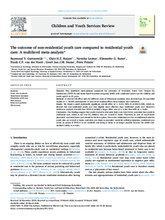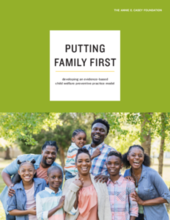Displaying 741 - 750 of 2509
Sharing Ideas that Strengthen Families and Engage Communities to Promote Child Well-Being will bring together policy, research, and practice professionals from child- and family-serving systems in the United States and other countries, as well as youth, caregivers, and community partners, to share and advance more effective family supports and systems of care for children and families in the 21st century.
This article from the Marshall Project describes some of the detrimental impacts the COVID-19 crisis has had on children in foster care in the U.S.
In this opinion piece for The Hill, Susan N. Dreyfus, president and CEO of the Alliance for Strong Families and Communities, calls on the U.S. government to provide support to the nation's child welfare system, "which has the critical responsibility of keeping our families strong and intact so that parents can care for their children safely at home."
The coronavirus pandemic and the new restrictions in place to limit the spread of the infection have presented several difficulties for foster families in California, including how to manage visits between foster children and their families.
In this opinion piece for Bloomberg, Francis Wilkinson discusses findings from a recent U.S. government review of the separation of children from their families by Department of Homeland Security, including Customs and Border Patrol, the Office of Field Operations and Immigration and Customs Enforcement at the U.S. border with Mexico.
"Hundreds of thousands of vulnerable U.S. children could face a heightened risk of abuse and neglect as coronavirus-related school closures keep them at home and away from the nation’s biggest group of hotline tipsters: educators," says this article from USA Today.
This article from NPR accompanies a brief radio segment highlighting the difficulties faced by families with children in foster care during the COVID-19 pandemic, particularly the suspension of in-person visits between parents and their children.
Preliminary findings from studies using abbreviated formats of Parent-Child Interaction Therapy (PCIT) suggest effectiveness of such adaptations in reducing externalizing behavior in foster children and maintaining behavioral improvements several months after the end of the treatment.
This multilevel meta-analysis compared the outcomes of Treatment Foster Care Oregon for Adolescents (TFCO-A) and home-based treatment programs (HBT) with residential youth care for children and youth aged 0 to 23 years.
This paper from the Annie E. Casey Foundation provides guidance for state child welfare agencies on what to consider when developing a preventive practice model that aligns with the requirements of Family First, addresses the unique needs of families within local communities and ensures that selected programs and practices are feasible to implement with quality.


